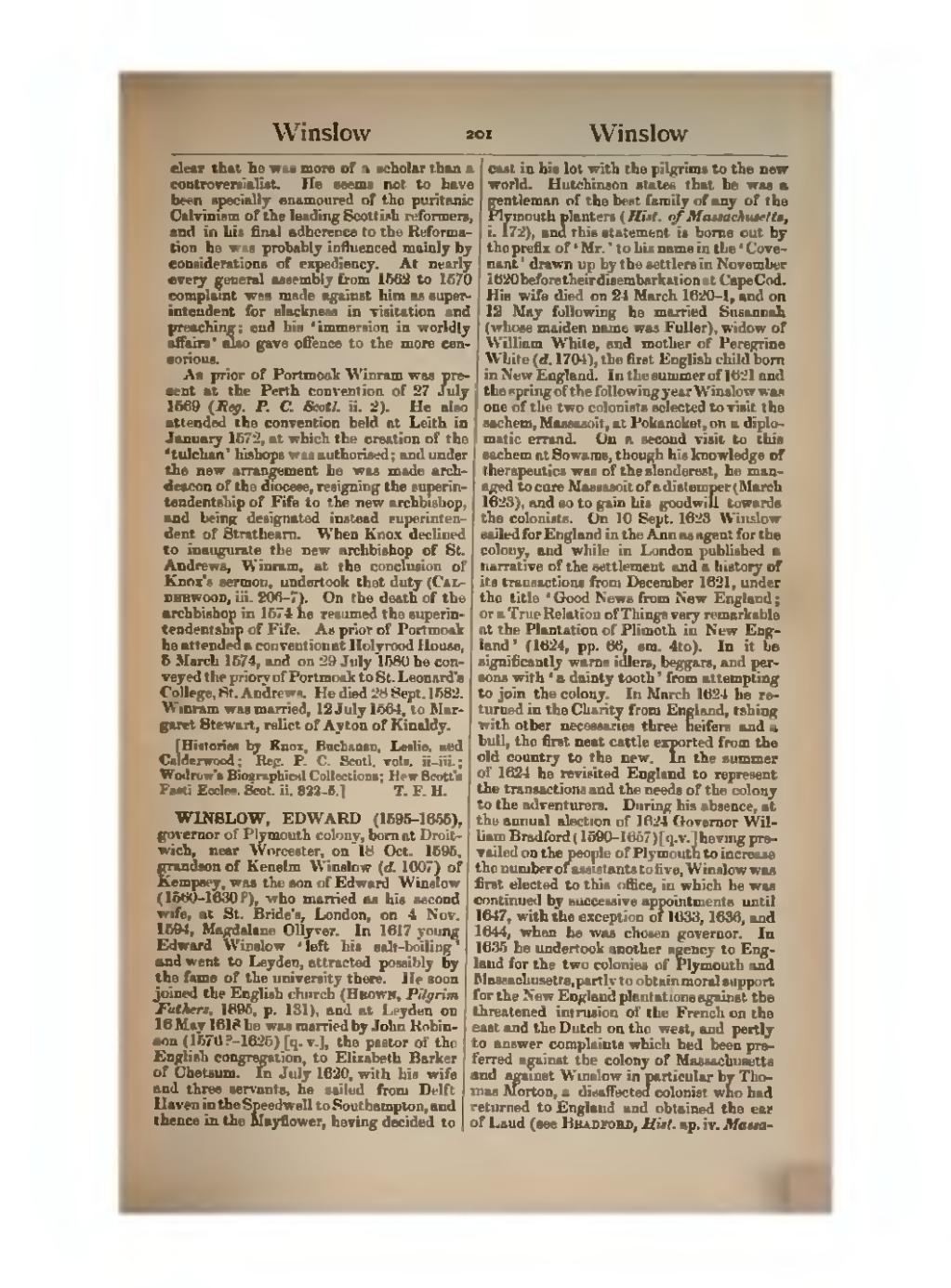clear that he was more of a scholar than a controversialist. He seems not to have been specially enamoured of the puritanic Calvinism of the leading Scottish reformers, and in his final adherence to the Reformation he was probably influenced mainly by considerations of expediency. At nearly every general assembly from 1562 to 1570 complaint was made against him as superintendent for slackness in visitation and preaching; and his ‘immersion in worldly affairs’ also gave offence to the more censorious.
As prior of Portmoak Winram was present at the Perth convention of 27 July 1569 (Reg. P. C. Scotl. ii. 2). He also attended the convention held at Leith in January 1572, at which the creation of the ‘tulchan’ bishops was authorised; and under the new arrangement he was made archdeacon of the diocese, resigning the superintendentship of Fife to the new archbishop, and being designated instead superintendent of Strathearn. When Knox declined to inaugurate the new archbishop of St. Andrews, Winram, at the conclusion of Knox's sermon, undertook that duty (Calderwood, iii. 206–7). On the death of the archbishop in 1574 he resumed the superintendentship of Fife. As prior of Portmoak he attended a convention at Holyrood House, 5 March 1574, and on 29 July 1580 he conveyed the priory of Portmoak to St. Leonard's College, St. Andrews. He died 28 Sept. 1582. Winram was married, 12 July 1564, to Margaret Stewart, relict of Ayton of Kinaldy.
[Histories by Knox, Buchanan, Leslie, and Calderwood; Reg. P. C. Scotl. vols. ii–iii.; Wodrow's Biographical Collections; Hew Scott's Fasti Eccles. Scot. ii. 822–5.]
WINSLOW, EDWARD (1595–1655), governor of Plymouth colony, born at Droitwich, near Worcester, on 18 Oct. 1595, grandson of Kenelm Winslow (d. 1607) of Kempsey, was the son of Edward Winslow (1560–1630?), who married as his second wife, at St. Bride's, London, on 4 Nov. 1594, Magdalene Ollyver. In 1617 young Edward Winslow ‘left his salt-boiling’ and went to Leyden, attracted possibly by the fame of the university there. He soon joined the English church (Brown, Pilgrim Fathers, 1895, p. 131), and at Leyden on 16 May 1618 he was married by John Robinson (1576?–1625) [q. v.], the pastor of the English congregation, to Elizabeth Barker of Chetsum. In July 1620, with his wife and three servants, he sailed from Delft Haven in the Speedwell to Southampton, and thence in the Mayflower, having decided to cast in his lot with the pilgrims to the new world. Hutchinson states that he was a gentleman of the best family of any of the Plymouth planters (Hist. of Massachusetts, i. 172), and this statement is borne out by the prefix of ‘Mr.’ to his name in the ‘Covenant’ drawn up by the settlers in November 1620 before their disembarkation at Cape Cod. His wife died on 24 March 1620–1, and on 12 May following he married Susannah (whose maiden name was Fuller), widow of William White, and mother of Peregrine White (d. 1704), the first English child born in New England. In the summer of 1621 and the spring of the following year Winslow was one of the two colonists selected to visit the sachem, Massasoit, at Pokanoket, on a diplomatic errand. On a second visit to this sachem at Sowams, though his knowledge of therapeutics was of the slenderest, he managed to cure Massasoit of a distemper (March 1623), and so to gain his goodwill towards the colonists. On 10 Sept. 1623 Winslow sailed for England in the Ann as agent for the colony, and while in London published a narrative of the settlement and a history of its transactions from December 1621, under the title ‘Good News from New England; or a True Relation of Things very remarkable at the Plantation of Plimoth in New England’ (1624, pp. 66, sm. 4to). In it he significantly warns idlers, beggars, and persons with ‘a dainty tooth’ from attempting to join the colony. In March 1624 he returned in the Charity from England, taking with other necessaries three heifers and a bull, the first neat cattle exported from the old country to the new. In the summer of 1624 he revisited England to represent the transactions and the needs of the colony to the adventurers. During his absence, at the annual election of 1624 Governor William Bradford (1590–1657) [q. v.] having prevailed on the people of Plymouth to increase the number of assistants to five, Winslow was first elected to this office, in which he was continued by successive appointments until 1647, with the exception of 1633, 1636, and 1644, when he was chosen governor. In 1635 he undertook another agency to England for the two colonies of Plymouth and Massachusetts, partly to obtain moral support for the New England plantations against the threatened intrusion of the French on the east and the Dutch on the west, and partly to answer complaints which had been preferred against the colony of Massachusetts and against Winslow in particular by Thomas Morton, a disaffected colonist who had returned to England and obtained the ear of Laud (see Bradford, Hist. ap. iv. Massa-
